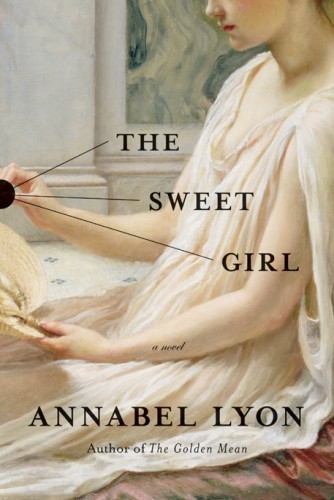
The Sweet Girl
کتاب های مرتبط
- اطلاعات
- نقد و بررسی
- دیدگاه کاربران
نقد و بررسی

May 6, 2013
Lyon returns to ancient Greece for her second novel, this time focusing on Aristotle’s daughter, Pythias. At the outset, she is seven years old and devoted to her famous father, curious about the world around her and displaying her father’s powers of debate and observation. She chafes at woman’s work and the limitations of her gender, a problem that only grows as she matures and finds herself caught between Aristotle’s world of inquiry and the woman’s world where she is expected to dwell. When Alexander the Great dies, Aristotle—a fellow Macedonian and Alexander’s teacher—must flee to the countryside, where he dies. Aristotle’s will dictates a course for the rest of his daughter’s life—including marriage to Nicanor, a distant cousin, which would entail surrendering to a domesticity for which Pythias, now a teenager, is too clever by half. Lyons writes the tale of Pythias’s efforts to escape, and the price she must pay to claim the life she desires. Writing in the present tense, Lyon does a remarkable job of making Pythias, her ancient world, and her eternal problems raw and compelling. While this book necessarily lacks the surprising freshness of The Golden Mean, Lyons nonetheless lives up to her promise, delivering to readers a modern twist on the ancient world.

May 1, 2013
Aristotle's daughter receives some harsh lessons in sexism and the limits of philosophy. Lyon's previous novel, The Golden Mean (2010), explored the relationship between Aristotle and Alexander the Great, while this follow-up centers on Pythias, the Greek philosopher's adolescent daughter. She has her father's intellectual curiosity--she's bloodily dissecting a lamb in the novel's bracing opening scene--but the Athenian cognoscenti readily dismisses a young woman with ambitions beyond housekeeping. Even her relatively progressive father has decided on her husband, a cousin who may have died at war. The plot turns on the family's escape from Athens after Alexander's death (as a Macedonian, Aristotle fears his family will become targets) and, later, Pythias' efforts to carve out her own living for herself. Lyon's style is clean and brittle, evoking the intonations of Greek philosophical writings without parroting them, and she cannily introduces the Greek gods into the story--a dose of magical realism, perhaps, or just a bit of projection from Pythias when she's feeling adrift. As Pythias struggles for her own agency, she falls into the orbit of midwives and concubines, the sole positions where a graceful, intelligent, independent woman can find safety. Though this book isn't framed as a polemic, it still exposes the flaws in a system where slavery was commonplace and women's freedom was the function of men's ability and willingness to support them--Pythias' half brother Nico would be honored in the Nicomachean Ethics, and her adopted brother Myrmex is forgiven his bad behavior. This is not a heroic story of redemption--Greek tales don't work that way--but the novel still has the satisfaction of a well-told story, revealing a headstrong character's efforts to stay afloat despite a society inclined to sink her. A provocative tale that undoes any romantic delusions a reader might hold about ancient Greek society and thought.
COPYRIGHT(2013) Kirkus Reviews, ALL RIGHTS RESERVED.

January 1, 2013
Yes, philosophy majors, Canadian author Lyon's The Golden Mean is about Aristotle. Appealingly, this continuation (which can stand alone) is about his best student, daughter Pythias. A best seller in Canada.
Copyright 2013 Library Journal, LLC Used with permission.

June 1, 2013
Very little is known about Aristotle's daughter, Phythia, from the volumes of philosophy and history penned by the ancient Greeks, but Lyon has taken the available scraps to create a portrait of a young woman whose intelligence and spirit rival that of any philosopher of the time. Conceived when Aristotle was already quite elderly, Phythia is portrayed as the child of his heart--brilliant, inquisitive, fearless, and indulged. To the dismay of their traditional household the great philosopher teaches his daughter dissection, medicine, and natural history, subjects deemed less than useful for women. But the family is a happy one until the death of Alexander the Great causes an uprising in Athens and forces Macedonians loyal to the king to flee the city. When Aristotle dies shortly after their exile to a small town, Phythia finds herself unprotected and at the mercy of rebellious servants, suspicious neighbors, and unscrupulous men who would take advantage of her youth and naivete. VERDICT Lyon won the Rogers Writers' Trust Fiction Prize for The Golden Mean, a Canadian best seller about the relationship between Aristotle and his most famous pupil, Alexander the Great. In this follow-up to that award-winning debut, the author seamlessly fuses the history of the ancient world with the rich earthiness of her characters' everyday lives, dreams, and ambitions. [See Prepub Alert, 1/13.]--Jane Henriksen Baird, Anchorage P.L., AK
Copyright 2013 Library Journal, LLC Used with permission.

























دیدگاه کاربران